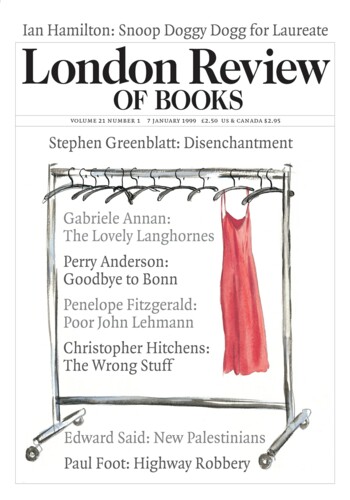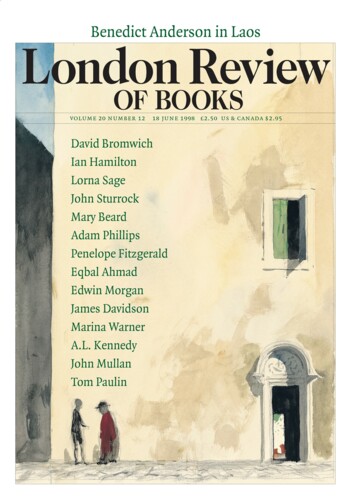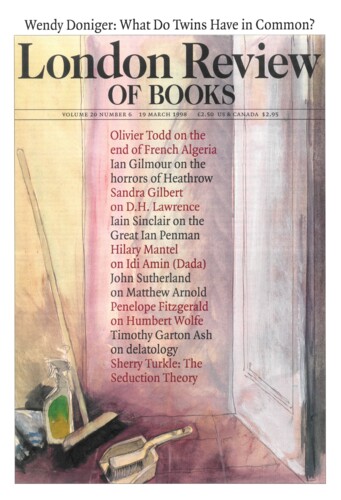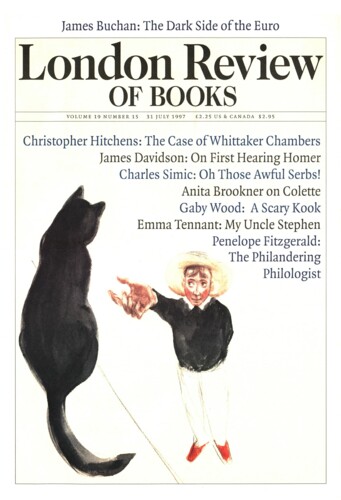Penelope Fitzgerald
Penelope Fitzgerald was the author of nine novels, including Offshore, which won the Booker Prize in 1979, and The Blue Flower. She wrote nearly fifty pieces for the LRB before her death in 2000 on subjects including Stevie Smith, Radclyffe Hall, Charlotte Mew, Anne Enright and Edward White Benson. A collection of some of her essays for the paper is available from the LRB store. Jenny Turner wrote about the difficulties of her life and the method of her books, ‘building then shattering and compressing the piles of information’.
What’s Happening in the Engine-Room: Poor John Lehmann
Penelope Fitzgerald, 7 January 1999
The first volume of John Lehmann’s autobiography, published in 1955, starts:
Renewing the Struggle: Edward White Benson
Penelope Fitzgerald, 18 June 1998
It’s more of a difficulty than a help that so much has been written about the Bensons (Palmer and Lloyd have already done a biography of Fred Benson) and that the family should have written so much about themselves. The Archbishop kept diaries, and his wife Minnie wrote two – one a dutiful sightseer’s journal, kept at her husband’s suggestion on her honeymoon, another one 20 years later which told some, at least, of the story of her heart. (There is also a contemporary diary of Minnie’s for 1862-63.) Arthur Benson wrote four and a half million words of diaries, a book of family reminiscences, a family genealogy, lives of his father, his sister Maggie and his brother Hugh, and a memoir of his sister Nellie. Fred wrote Our Family Affairs, Mother, As we Were and (almost on his deathbed) Final Edition. He also kept a diary. The Bensons, ‘a rather close little corporation’, as Arthur called them, had a boundless talent for self-expression, self-justification and self-explanation. Yet they did not give themselves away.’‘
Seeing and Being Seen: Humbert Wolfe
Penelope Fitzgerald, 19 March 1998
‘An obituary,’ Virginia Woolf wrote on Saturday, 6 January 1940.
Large and Rolling
Penelope Fitzgerald, 31 July 1997
Anthony Sampson begins and ends his book with an account of his grandfather’s funeral, held, as requested in his will, at the top of a Welsh mountain, Foel Goch. Among the mourners were Gypsy harpers and fiddlers, scholars, civic officials and ‘the painter Mr Augustus John’. ‘Hundreds of spectators,’ it was reported, ‘waited for the coming of the mortal remains of Dr John Sampson, the well-known philologist and librarian of Liverpool University.’ As a specialist in Romani he had been known – not only to the Gypsies – as the Rai, the Master. Indeed the Daily Express (this was in 1931) began its obituary with a quotation from Browning’s ‘Grammarian’s Funeral’: ‘Leave him still loftier than the world suspects.’ Afterwards there was a tremendous blow-out, complete with wines and cigars, at the White Lion in Cerrigydrudion. But Michael Sampson, Anthony’s father, who had scattered the ashes nine times over the mountain, looks cold and ill at ease in the faded press photographs. And the Rai’s widow was not present.’
Pieces about Penelope Fitzgerald in the LRB
Making Do and Mending: Penelope Fitzgerald’s Letters
Rosemary Hill, 25 September 2008
In 1997, three years before her death, Penelope Fitzgerald asked her American publisher, Chris Carduff, who had offered to send her any books she wanted, for a copy of Wild America by Roger Tory...
Playing the Seraphine: Penelope Fitzgerald
Frank Kermode, 25 January 2001
This is a collection of eight stories, the oldest first published in 1975, the most recent in 1999; so they punctuate the entire, brief career of a writer who never yielded to the temptation to go on...
Dark Fates
Frank Kermode, 5 October 1995
Penelope Fitzgerald’s The Blue Flower is a historical novel based on the life of the poet, aphorist, novelist, Friedrich von Hardenberg, a Saxon nobleman who wrote under the name of Novalis...
Taken with Daisy
Peter Campbell, 13 September 1990
Penelope Fitzgerald’s new novel, like her last one, The Beginning of Spring, is set just before the First World War. Its locale, 1912 Cambridge, is not much less exotic than its...
Women’s Fiction
Margaret Walters, 13 October 1988
Penelope Fitzgerald has always seemed a quintessentially English novelist, low-key, exquisitely perceptive, and with a notable feeling for place – the seedy houseboats on the Thames in
Chiara Ridolfi
C.K. Stead, 9 October 1986
Penelope Fitzgerald’s Innocence is set in Florence, the principal characters are Italian, and I kept asking myself: how is it done? She knows quite a lot about Italian society: but more...
Finishing Touches
Susannah Clapp, 20 December 1984
On 24 March 1928 Charlotte Mew killed herself by drinking a bottle of disinfectant in a nursing-home near Baker Street. She left behind her a volume of poems, a number of uncollected essays and...
Nationalities
John Sutherland, 6 May 1982
A new novel by Günter Grass invites comparisons of a national kind. If a British writer of fiction wished to engage with the big stories of the day – the kind of thing Brian Walden...
The Duckworth School of Writers
Frank Kermode, 20 November 1980
The potter William de Morgan, finding himself at the age of 65 without a studio, decided not to look for another but instead to change his trade and become a novelist. Not so long ago the lucky...
Read anywhere with the London Review of Books app, available now from the App Store for Apple devices, Google Play for Android devices and Amazon for your Kindle Fire.
Sign up to our newsletter
For highlights from the latest issue, our archive and the blog, as well as news, events and exclusive promotions.




